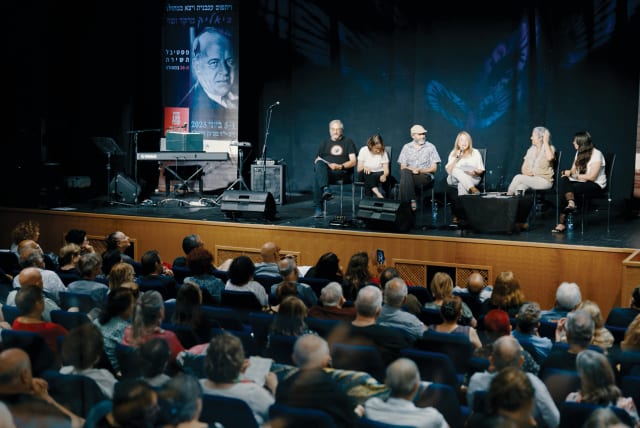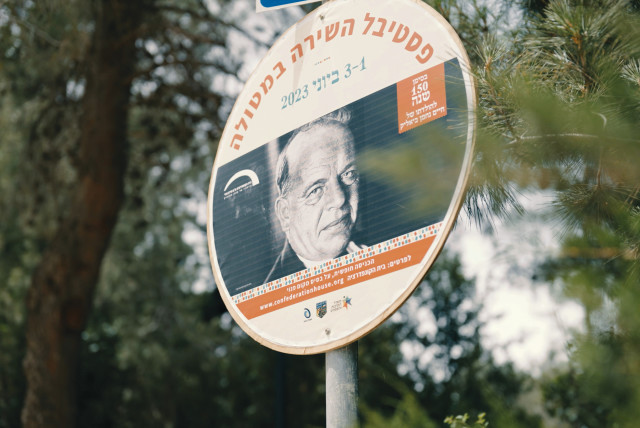Wonderful but marginal: Hebrew Poetry Festival returns to Israel's North

This year the festival was dedicated to the memory of Hayim Nachman Bialik, whose birth took place 150 years ago near Zhytomyr, Russia.
The greatest happiness is to do our duty, and our foremost duty is to reach the place we can. – Hayim Nachman Bialik
It is written in the prophetical books that at the end of days an evil wind will blow on Israel from the North. In today’s situation that seems very possible, since Israel’s northern border presses up against Lebanon – perhaps the most unstable state in the area – with Hezbollah aiming its huge arsenal of weaponry at the only non-Muslim state in the Middle East.
Yet, as gruesome as these scenarios are, they did not seem to worry the posse of poets and their dedicated followers who gathered in Israel’s northernmost town, Metulla, for the 26th annual Hebrew Poetry Festival in early June. For three days and nights, they listened to Hebrew poets and their critics as they read out their work or commented on the historical significance of this or that poet or poem.
The fact that this festival always takes place in Metulla, a town near the northern border, is not by chance. It was located there by the Zionist Confederation House in order to bring a strong sense of Israeli culture to the periphery, as well as provide some source of income to the local hotels. In return, the festival gets the free use of the town’s main cultural venue.
A festival dedicated to Hayim Hachman Bialik
This year the festival was dedicated to the memory of Hayim Nachman Bialik, whose birth took place 150 years ago near Zhytomyr, Russia. One of his many activities – he was also a translator, editor, creator of children’s literature, anthologist, public speaker, and so on – was his contribution to Hebrew poetry.
Bialik was, in fact, the father of modern Hebrew poetry. Even though he wrote his poems to be read in an Ashkenazi accent, and he wrote most of his work in the Diaspora, he is considered the poet who was able to make the link between the tradition and modernity.
Even an apparently simple poem such as Bialik’s children’s poem “Na’ad Ned” which, set to music, became a standard for all children to sing in kindergarten, is laced with references to traditional Jewish sources including those from the mystical Kabbalah.
He was insistent that you had to know Jewish sources in order to write in a Hebrew that related to the tradition – without necessarily upholding the religious traditions with which he was inculcated via the Volozhin yeshiva in his native Ukraine. As much as Bialik rebelled against his strictly Orthodox upbringing, he fought tirelessly to keep a deep connection with Hebrew writers from all earlier generations. He even co-published a large volume called The Book of Legends in which he quoted rabbinic sources to the many stories in the Hebrew Bible.
“But who knows this anymore?’ asks Haim Be’er, one of Israel’s most widely read writers.
Be’er’s work encompasses poetry, novels, and literary criticism. He is also the Israeli writer with the most traditional background, and he peppers his speech with references to biblical and rabbinic sources as well as Yiddish.
But as he himself says, “I am deeply disturbed by the drift of contemporary Hebrew. I don’t understand even my own grandchildren. I love them but I am an alien and weird for them. If it were a private thing just for me, it would be something else, but it’s the whole generation. We have lost the connection. What is to be done? It breaks my heart.”
Be’er feels that “Hebrew has now reached a requiem.” What is left? he asks.
“You have the haredi world who wish to save the culture in which they grew up, but they don’t want, or can’t, progress from where they are.” They are stuck in history, he says. In “the 17th century or even beforehand.”
Be’er continues, “The Talmud, which I have taught, is a major source of Hebrew literature. But no one is interested in it anymore. I am very pessimistic.”
What Be’er hints at is the tremendous rift that took place in the 19th century with the emergence of secular Zionism.
In his insightful book, Hazar bli Teshuva, philosopher Micha Goodman points out that there were in fact two main tendencies of those who shaped Zionism. There were those like Micha Yosef Berdichevsky and the novelist Haim Brenner who wished to abandon anything Jewish, even in the language; despite the fact that they wrote in Hebrew!
Then there were other thinkers, such as Ahad Ha’am and Biailik – who insisted on knowing the tradition and even updating it, so that it would be relevant to the contemporary world.
Bialik did this famously with his Israeli Sabbath, or Oneg Shabbat, in which he set up centers for the study of Jewish texts on the Shabbat, centers which became very popular among secular Israelis. There they would present lectures and discussions in Hebrew.
Most of this, according to Be’er, is now gone, except for some very small groups. Zionist Israelis are in the main, in Amos Elon’s memorable phrase, “Hebrew-speaking goyim.”
It was no surprise when, in the course of our conversation, a passerby said to Be’er: “You’re our rabbi; people come to you for advice, as they would in the old days.” Be’er, of course, denies this, but it’s true.
Hebrew is a dense language. If you take a word in English like “wise,” you would know how to use it without any reference to the past. “He is a wise person,” speaks for itself.
In Hebrew, however, if you use the word haham, it’s immediately associated with the biblical Solomon, the “wisest of men”; or you ask: “Who is wise?” and the answer, straight from Ethics of the Fathers, is: “Someone who learns from all people.”
You have the “wise son” sitting at the Passover table asking intelligent questions; and many a sage throughout Jewish history is referred to as a haham, indicating his possession of a certain type of sacred knowledge, and so on, and so forth. Hebrew, therefore, has form, history, and tradition. What happens when these associations disappear? When they no longer carry this rich freight? This is the problem that confronts Be’er.
This lack of connection, says Be’er, who is also a retired professor of Hebrew literature, has been made even more trenchant by the recent deaths of some of leading Hebrew language writers, Meir Shalev, Jonathan Geffen, and Meir Weiseltier.
“There won’t be another Meir Shalev,” observes Be’er. “His first book was a clever take on the Tanach. He was extremely learned in the sources. He was not religious – very far from it, but at the same time, he was an expert in Jewish sources, especially from the Bible.”
Women writers from the previous generation were also mentioned throughout the festival, such as Leah Goldberg, Daliah Ravikovitch, and Yonah Wallach. Some of those who spoke had been their students.
Despite the gloomy predictions, the festival offered poems old and new, interviews with living authors, and live music based on the poems. Poetry it seems, is one of the last pockets of genuine Zionist creativity.
By contrast, in the world of politics, for example, Hebrew is no longer just the language of prayer, study, and discussion. It has changed along with the landscape in which it now finds itself. In the words of poet Yehuda Amichai, it is a weary language – “a language that was torn from its sleep in the Bible: dazzled, it wobbles from mouth to mouth. In a language that once described miracles and God – to say ‘car,’ ‘bomb,’ God.”
To put the festival into more of an international perspective, one speaker told of going to a reading by the well-known American poet, John Ashberry, in London. Only 10 people turned up, proving to the speaker just how hard it is to interest the wider population in poetry. Another speaker railed against publishers, who for the most part ignore poetry or poets. He suggested that writers strike out on their own.
Among the other subjects to be discussed was the difference between genuine research into the poets’ meanings and gossip about their private lives, and how this could have affected their works. Did the fact that Bialik had a number of mistresses have any significant effect on his poetry, and was this important? Though this led to a lively debate among the panel of experts, there was no real conclusion to the matter.
It would seem that Hebrew poetry, like Metulla itself, is fated to be on the margin of the Zionist project, at least for the predictable future. ■
Jerusalem Post Store
`; document.getElementById("linkPremium").innerHTML = cont; var divWithLink = document.getElementById("premium-link"); if (divWithLink !== null && divWithLink !== 'undefined') { divWithLink.style.border = "solid 1px #cb0f3e"; divWithLink.style.textAlign = "center"; divWithLink.style.marginBottom = "15px"; divWithLink.style.marginTop = "15px"; divWithLink.style.width = "100%"; divWithLink.style.backgroundColor = "#122952"; divWithLink.style.color = "#ffffff"; divWithLink.style.lineHeight = "1.5"; } } (function (v, i) { });

